Georgia DUI Laws: BAC Limits, Penalties & Implied Consent
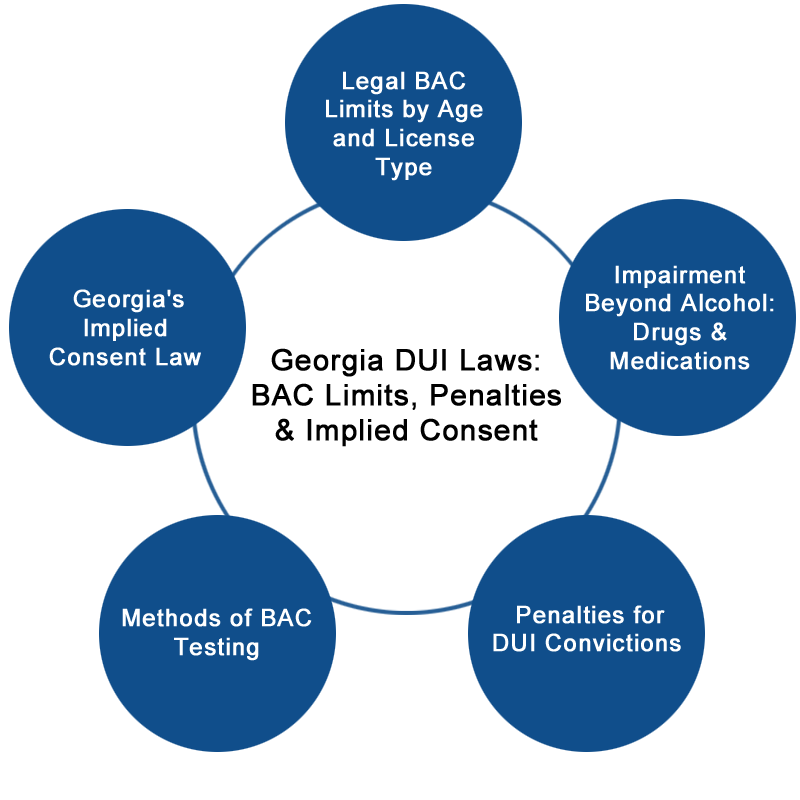
The criminal code of the state of Georgia outlines the laws regarding DUI in OCGA § 40-6-391, including all potential rules and penalties that could apply following a conviction. These statutes cover those who are found to be driving under the influence of drugs, alcohol or other substances.
For those over 21, the law sets a legal blood alcohol content (BAC) limit of .08%. As a measurement of alcohol in the system, this limit exists as a point where a driver’s ability to react to road situations is diminished, their focus is reduced and their presence on the road becomes more dangerous.
Police will measure BAC using a breathalyzer test, but they are not just checking for the presence of alcohol in your system. While there’s no hard-and-fast legal limit, law enforcement will use their best judgement to determine whether a driver is impaired due to drugs like marijuana, medications like oxycodone or other substances such as glue or aerosols.
Even if this is a medication you have legally taken, you can still be charged with DUI if that medication hampers your ability to safely drive a motor vehicle. For example, if you have been prescribed muscle relaxants or are taking cold medicine that makes you drowsy, these legal medications can still impair your reaction times and make you dangerous on the road.
That legal limit of .08% only applies to drivers over 21 years of age who do not hold a commercial driver’s license (CDL). For drivers under the age of 21, the legal limit is .02%, which is as close to zero-tolerance as possible. For CDL holders, the legal limit is .04%.
As Georgia has some of the strictest DUI laws in the country, it is vital to understand this law and the consequences that a DUI charge could bring, from fines, jail time and probation to forfeiture of license and mandatory community service. One of the most important aspects of Georgia’s DUI law to understand is the state’s Implied Consent Law.
Implied Consent in Georgia
Georgia is one of many states whose criminal code outlines an “Implied Consent Law.” What this law essentially means is that by virtue of driving on Georgia road, you consent to have your breath, blood or urine tested by law enforcement. This law not only makes it less desirable for motorists to refuse chemical tests, but also aids law enforcement in determining whether a driver is impaired.
Because of this implied consent law, a refusal to submit to chemical testing following a DUI arrest can have several consequences, including:
Automatic Suspension of Driver’s License. A refusal triggers an automatic and immediate one-year suspension of your license, even if you are not ultimately convicted of a DUI. Rendered separately from any criminal charges, this suspension can be contested if you file for an Administrative License Suspension (ALS) hearing within 30 days of the arrest.
Refusal Can Be Used Against You in Court. The prosecution can use your refusal to submit to chemicals testing as evidence that you were driving impaired, implying that you were trying to conceal your intoxication.
The Two Cases Against You
If you are charged with DUI in the state of Georgia, you are actually facing two completely different sets of charges. The first is the suspension of your driver’s license. The second is the criminal charge against you – this would be the laws described in OCGA § 40-6-391 which you allegedly violated by driving while impaired.
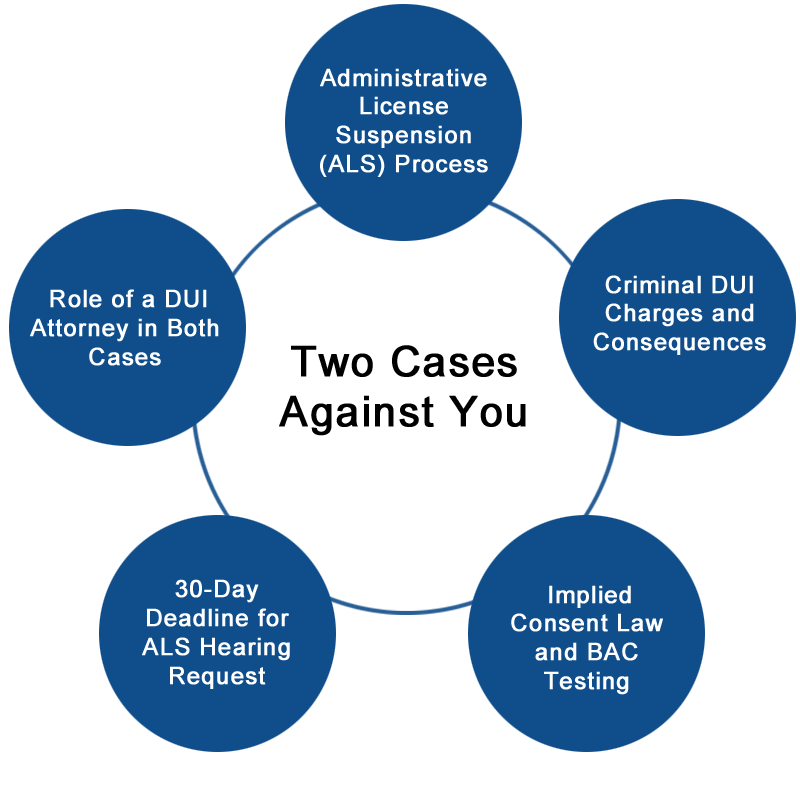
Triggered automatically when you are arrested for DUI, this one-year license suspension is overseen by the Georgia Department of Driver Services (DDS) under the implied consent law. Note that this suspension can come either when you are found to have a BAC of .08% or higher, or when you refuse a breathalyzer or other chemical test.
You have 30 days from the arrest to request an ALS hearing by filing a DPS 1206 form and paying a $150 fee. If you do, you can challenge the suspension and potentially restore your driving privileges. If you fail to request a hearing in that time, your license will be suspended for one year.
It is crucial to file for this hearing, not only to regain your driving privileges but also to give your attorney insight into the case against you and an opportunity to cross-examine the arresting officer before the criminal trial.
Separate from the administrative action against your driver’s license is the criminal case against you for DUI. Facilitated by the court system, a conviction on these charges can result in jail time, mandatory community service or DUI school, monetary fines, probation, increased insurance rates and a stain on your permanent criminal record.
During the criminal case, the court will weigh the evidence against you including testimony from the arresting officer, blood or breath test results and dashcam footage to determine your guilt or innocence. This is completely separate from the administrative case against you to suspend your license, and losing one case does not necessarily mean you will lose the other. However, it is vital that you address both.
And the best way to address both is to hire an experienced DUI attorney. They can not only make sure your paperwork is properly filed in the 30-day window to schedule an ALS hearing, but they can also create an interconnected strategy that addresses both the license suspension and the criminal charges, helping you retain your driving privileges and potentially see the criminal charges against you reduced or dismissed.
DUI Less Safe and DUI Per Se
In the state of Georgia, there are actually two different forms of DUI. Known as DUI Less Safe and DUI Per Se, these dual forms give law enforcement two different ways to charge you with a DUI. As such, it is important to understand the differences between them.
DUI Less Safe. This is a criminal charge you can face even if your BAC is found to be below the legal limit of .08% or if you refuse to have your blood or breath tested. As the name implies, this charge finds that, while you were legally sober, you were visibly intoxicated based on the arresting officer’s observations. This can include behavioral signs (slurred speech, smelling like alcohol, driving erratically, difficulty understanding instructions) or failure to pass sobriety tests such as the walk-and-turn, one-leg stand and horizontal gaze tests.
DUI Per Se. This is the straightforward form of DUI you will be charged with if you are found to have a BAC of .08% or above within three hours of driving. This is the legal limit for most drivers, although it is reduced to .04% for commercial drivers and .02% for drivers younger than 21. Even if you do not exhibit any signs of impairment, your BAC alone can be enough to justify charges.
Police can charge you with either or both types of DUI, and in fact it is common for them to issue both to increase the odds of securing a conviction. Each carries a unique set of penalties from jail time and fines to license suspension and mandatory DUI school, and can be challenged by your attorney.
How Prior DUI Charges Can Affect Sentencing
If you are arrested for DUI, any prior convictions for DUI – in Georgia or in another state – within the last 10 years can be used to determine the penalties you’ll face if convicted. Known as the lookback period or washout period, this 10-year span is measured from the date of your previous DUI arrest. If you have a previous conviction within that span, you will likely face more severe consequences including longer jail time and higher fines.
If you have multiple priors, the consequences grow exponentially. For example, if the latest DUI arrest is your third offense within that lookback period, it will be considered a “high and aggravated misdemeanor” carrying a mandatory minimum of 15 days in jail and fines up to $5,000. If it is your fourth offense within that span, the latest DUI will be charged as a felony, carrying up to five years in prison and permanent suspension of driving privileges.
This creates, in essence, a three-tiered set of consequences between a misdemeanor, aggravated misdemeanor (even though Georgia law does not specifically rule for “aggravated DUI”) and felony DUI.
Penalties for Misdemeanor DUI
Most first-time offenders will be charged with misdemeanor DUI. A conviction will remain part of their criminal record, and will carry the following consequences:
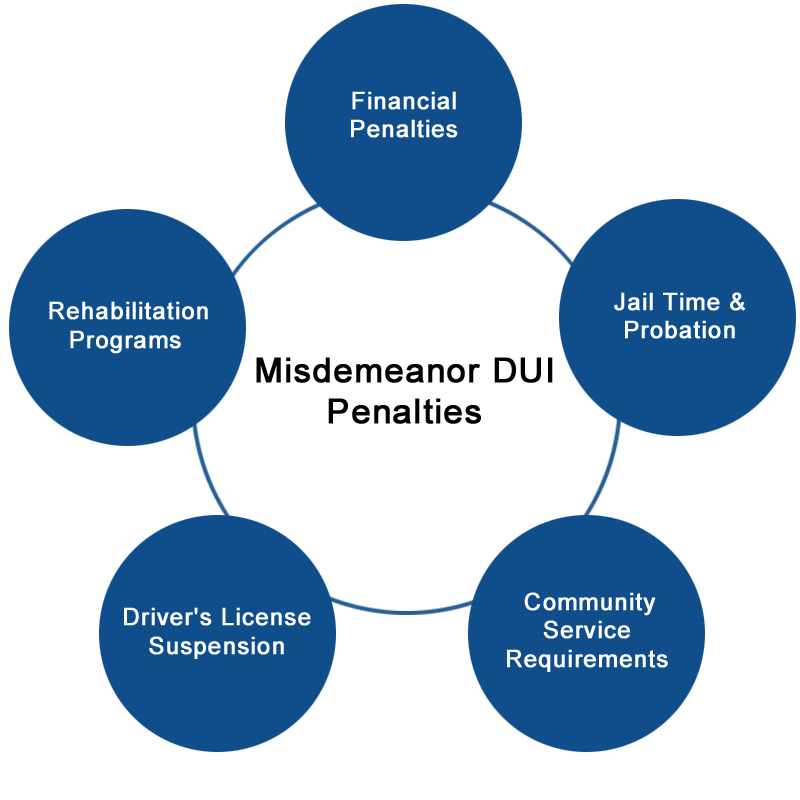
– Fines: Between $300-$1,000 but court costs and fees could bring this to the $700-$2,000 range.
– Jail Time: Between 24 hours and a year, with the possibility of a credit for time served.
– Probation: Up to 12 months, with mandatory check-ins, court-ordered programs and possible abstinence from drug or alcohol use.
– Community Service: Minimum of 20 hours if charged with DUI Less Safe, or 40 hours if charged with DUI Per Se.
– Driver’s License Suspension: Minimum of 12 months, with the possibility of early reinstatement after 120 days with completion of DUI school and payment of reinstatement fees.
– Other Conditions: Mandatory 20-hour risk reduction program, known as DUI school, costing roughly $355. Potential substance abuse evaluation to determine dependency issues that may have led to the DUI and subsequent counseling if needed.
Aggravating Factors
Even though there is no specific legal statute outlining aggravated DUI, the prosecution has an incredible amount of leeway to introduce aggravating factors that can elevate a DUI and lead to more severe penalties than the ones outlined above. A few of these aggravating factors include:
Elevated BAC: While .08% is the legal limit, those found with a particularly high BAC – .15% or higher – can face increased penalties including extended probation, mandatory community service or installation of an ignition interlock device (IID).
Involvement of a Child: The presence of a child in the vehicle at the time of the arrest can lead to increased penalties such as a mandatory IID as well as further charges.
Damage to Property or Others: If the DUI arrest followed an accident that caused injury, death or property damage, jail time and fines can increase, plus the accused may be liable for restitution costs.
Not Cooperating with Officers: Attempts to resist arrest or flee the scene, or any uncooperative behavior, may rest in extended probation or community service.
Driving Recklessly: This could be before the traffic stop is initiated, or afterward if the driver attempts to flee, and could result in enhanced or additional charges.
Prior DUI Convictions: If the latest offense marks the second or third DUI within the 10-year lookback period, it may not elevate the charges to Felony DUI, but it will likely result in increased penalties.
Penalties for Felony DUI
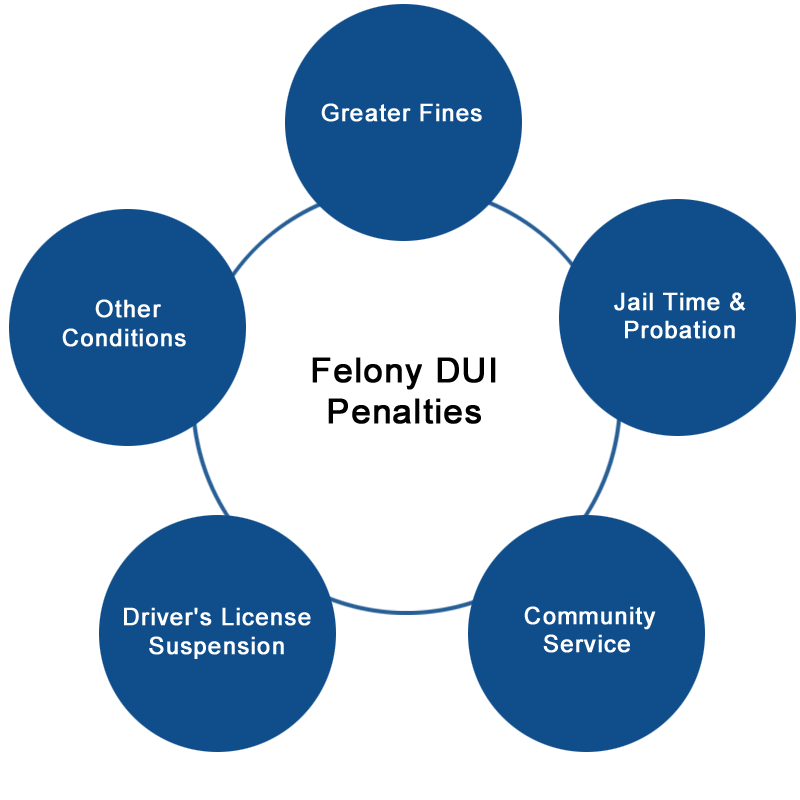
Commission of multiple DUIs within the 10-year lookback period can result in a charge of Felony DUI, but even a first-time DUI can be charged as a felony due to aggravating factors. A few of these include if serious injury or death occurs as a result of the driver’s impairment, if a child under the age of 14 was in the vehicle at the time, or if the driver demonstrated an elevated BAC, typically .02% or more. Those facing their first Felony DUI can expect the following consequences:
– Fines: Up to $5,000 and potentially beyond, along with restitution payments to victims.
– Jail Time: A minimum of 1 year with potential for more than 5 years depending on the circumstances of the offense. Convictions for vehicular homicide can result in up to a 15-year prison sentence.
– Probation: Potential for extended probation with mandatory check-ins, court-ordered programs and possible abstinence from drug or alcohol use.
– Community Service: At the judge’s discretion.
– Driver’s License Suspension: For a Felony DUI conviction, driving privileges are typically suspended for an extended period or revoked permanently.
– Other Conditions: Mandatory attendance at a Victim Impact Panel, where the offender will hear firsthand from those impacted by impaired driving. Mandatory treatment programs to treat substance dependence. Increased insurance premiums, if insurance can be obtained at all. Mandatory installation of an IID for 12 months if driving privileges are reinstated.
Beyond all of this, as a Felony DUI, the conviction will become a permanent part of the offender’s criminal record, affecting their ability to secure housing or employment and limiting their Constitutional rights to vote or own a firearm.
Taking the First Steps: Challenging Your Driver’s License Suspension
If you have been arrested for DUI, the first order of business is to file an appeal of your driver’s license suspension, granting you the ability to continue driving until the criminal hearing. This requires filing a DPS 1206 form within the first 30 days following the arrest to request a hearing with the Office of State Administrative Hearings (OSAH) for an ALS hearing.
Along with the DPS 1206 form, you will be required to pay a $150 fee for a first-time DUI, with that amount rising to $250 for a second DUI or when there are other aggravating factors. Once the form and the fee are processed, so long as they are filed within the first 30 days following the arrest, OSAH will schedule a hearing to let you contest your driver’s license being suspended. If you are successful, for example if the arresting officer fails to appear or the prosecution cannot provide sufficient evidence to justify suspending your license, you will retain your license until the end of the criminal case against you.
The evidence that the arresting officer must present at this hearing includes the following:
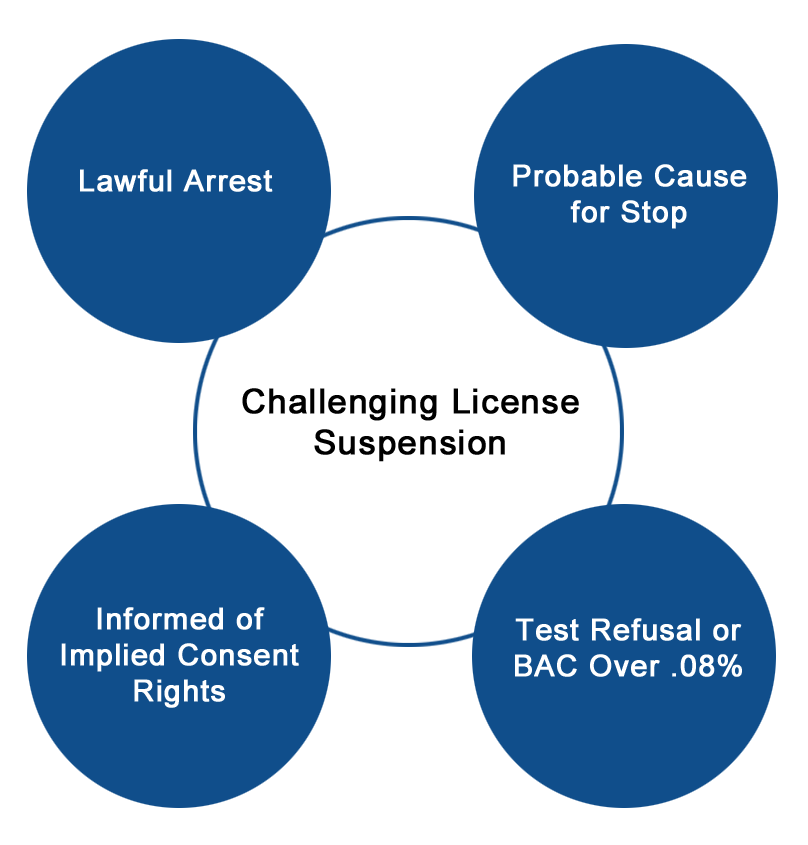
– That you were lawfully placed under arrest.
– That the officer had probable cause to initiate the traffic stop.
– That you were fully informed of your rights under Georgia’s implied consent law, including penalties that arise from refusing the breath or blood test.
– That you then either refused the test or took the test and were shown to have a BAC above .08%
The ALS hearing also gives your attorney a chance to cross-examine the officer, challenging their testimony and discerning any illegal or incorrect procedures they may have followed. Essentially, this is a deposition of the arresting officer, giving your attorney a chance to get facts on the record that can be used later on in the criminal trial, plus providing a preview of the evidence and case to be used against you. So not only can you potentially lift the suspension of your driving privileges, your attorney can get a jump start on crafting a defense strategy.
Frequently Asked Questions
Will I get jail time for a first DUI conviction in Georgia?
It’s possible, but will depend on the results of the blood or breath tests, any aggravating factors, or the judge’s own reasoning. There are other mandatory minimum penalties, including fees, enrollment in DUI school and community service.
Will I lose my license?
Georgia law does require mandatory suspension of your driver’s license for a first DUI, or for those who refuse a blood or breath test, with the length of that suspension varying. You may challenge that suspension with an ALS hearing or appeal for a limited driving permit. You may also be required to complete DUI school, pay associated fees or install an IID to regain privileges.
What are the minimum penalties for first-time DUI?
Typically, you can expect to spend 24 hours in jail, pay a $300 fine, plus serve a probationary period, community service or attend DUI school. But beyond that, long-term consequences included increased insurance premiums, potential employment issues, restrictions on professional licensure, and a conviction on your criminal record. This conviction will be permanent unless your case is dismissed or you are acquitted.
What can I expect during my trial?
The criminal trial for the DUI charge will begin with a formal arraignment where you’ll enter your plea. Pre-trial motions will follow in which your attorney will attempt to reach a settlement with the prosecution. If no settlement is not reached a criminal trial will ensue. Your attorney will then challenge the evidence against you, showing that you were not impaired, or demonstrating illegal procedures during the traffic stop.
What is the typical bail amount for first-time DUI in Georgia?
Several variables, from the circumstances of the case to the county in which the incident happened, can impact bail amount, but it generally ranges between $500-$5,000.
What if I’m charged with DUI and I’m under 21?
Those below the legal drinking age face an automatic license suspension, plus penalties including mandatory DUI school, probation, community service and more.
How can I reduce the penalties for DUI?
An experienced DUI attorney can provide you with several options and strategies, including, plea bargaining, negotiating for probation, or offering to place you in DUI school or counseling. It is also possible for them to have charges dismissed or reduced to a lesser charge such as reckless driving by challenging the evidence against you or exposing procedural errors made during the arrest.
Should I plead guilty?
Your attorney will advise you on the best course of action, but know that a guilt plea can lead to immediate and severe penalties, plus long-term implications from having a conviction on your criminal record.
If I’m convicted, am I required to tell my employer?
That will depend on your own situation, including company policies or stipulations in your employment contract. It is required for certain professions.
How can an attorney help?
A DUI is a serious offense, and an attorney can help you work through the complex process of both the license suspension and criminal hearings that result. They can work to challenge the evidence and build a case for your defense that could see your charges acquitted, dismissed or reduced. Their fees will depend on the amount of work involved and the circumstances of the case.
Strategies for Challenging a DUI Charge
An arrest for DUI does not mean that you will be convicted. Your attorney is there to ensure that you have the best possible outcome, whether that is a dismissal, an acquittal, or a reduction in the charges against you. And there are several strategies that they can utilize to see your freedom restored, challenging the evidence against you and undermining the prosecution’s case against you. A few of these strategies include:

Challenging the Initial Traffic Stop and Arrest: There are a myriad of ways to challenge the legitimacy of the initial traffic stop. For example, the officer must demonstrate that they had a reasonable suspicion to pull you over, such as erratic driving or a moving violation. And even if they can prove reasonable suspicion to make the stop, the officer must show that they had probable cause to make the arrest based on their own judgement, which can be subjective. For example, they may observe bloodshot eyes or slurred speech caused by allergies or lack of sleep and wrongly assume they are signs of intoxication. If they can’t effectively show that the stop was based on reasonable suspicion and the arrest made due to probable cause, the entire incident is considered unlawful and any evidence gathered as a result, including field sobriety or breathalyzer results, can be suppressed.
Disputing the Evidence: The evidence against you will often come in the form of sobriety test results and analysis of your BAC through breath or blood. Each of these tests carries their own flaws, making them vulnerable to cross-examination. Sobriety tests can be highly subjective, and even if the officer’s judgement can’t be questioned, the conditions of the test can be, from weather conditions and uneven terrain to whether the test was administered properly. The same scrutiny can apply to breathalyzer tests, which can be swayed by improperly maintained or calibrated equipment, malfunctions or even the presence of mouthwash. Those who have medical conditions like diabetes or Gastroesophageal Reflux Disease (GERD) may test higher than the average person. A delay in taking the test or a test administered too early can skew results. And blood tests are held to a strict chain of custody standard, meaning any deviation from procedure can compromise the test’s integrity.
How Zeliff | Watson Can Help
Facing your first DUI charge can be overwhelming. It may seem like the evidence against you is insurmountable. But know that our attorneys have a proven track record of helping clients just like you successfully argue their case and secure their freedom. That track record was built on our three foundational pillars: protection, empowerment, and achieving the best possible outcome.
We protect you by exhaustively preparing your defense, leaving no stone unturned as we dive deep into all of the details of your case. This thorough approach allows us to protect your freedom with a compelling case that identifies and exposes every flaw in the case against you. When we walk into the courtroom together, you can be confident that the attorney at your side knows your case inside and out, and is prepared to dismantle the prosecution’s case.
In that way, we empower you. Because you’ll walk into that courtroom with a firm grasp of the law and your constitutional rights. Educated and guided by your attorney, you’ll be able to look the prosecution in the eye, confident that you face them on equal footing and with a winning strategy at your disposal.
And that is how we build that third pillar, achieving the best possible outcome. It’s about more than just achieving an acquittal or seeing your charges dismissed; it’s about protecting your future, regaining control of your life and ensuring peace of mind.
Contact us today to schedule a free, no-obligation evaluation of your case. Meeting with one of our attorneys will give you a chance to discuss your case with an expert, evaluate different strategies, have your questions answered and face the charges against you with confidence.
A Simple Process to Getting Started

Schedule a Free Case Evaluation
Schedule a free, no-obligation, and confidential case consultation in person, online, or over the phone. This will help you understand how your case can be challenged, potentially leading to a reduction, dismissal, or acquittal of your charges. Click here to schedule your case evaluation.

Meet Our Defense Team and Conduct a Case Evaluation
During your free case evaluation, you’ll have the opportunity to ask questions, receive answers and legal guidance, and collaborate with our attorneys to better understand your side of the story, gather evidence, and devise a strategy to achieve the best possible outcome for your pending criminal charges.

Start Defending Your Case
After your free case evaluation, Zeliff & Watson will assist in preserving evidence and safeguarding your rights, ensuring your protection throughout the process. The defense team will also provide a proposed fee to represent your case, with the goal of achieving the best possible outcome.

